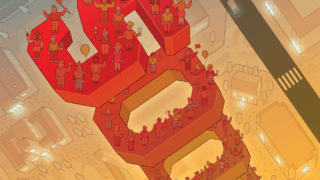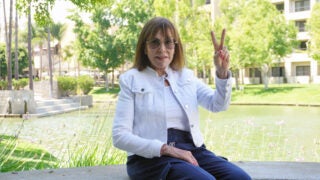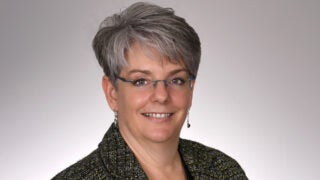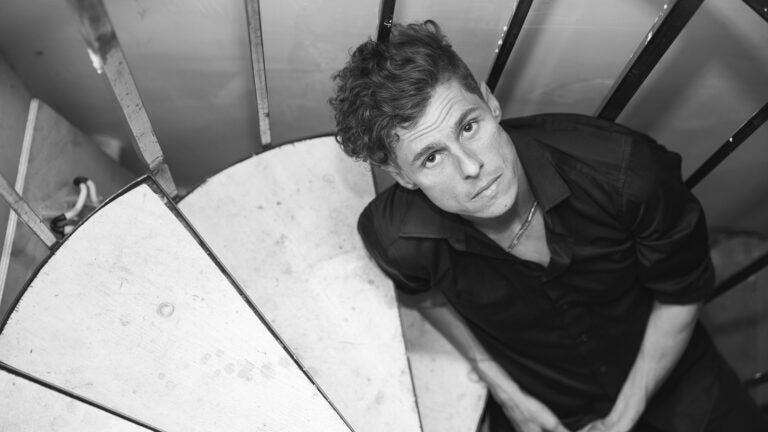
Skylar Funk was born Skylar Boorman but legally changed his last name to Funk — his late mother’s surname — shortly before enrolling at USC. “I’d been using it as a stage name since 2011,” he says. “Skylar Funk makes more sense as a music teacher.” (Photo: Colleen Allison)
Sustainability rock star: Skylar Funk
COMMENCEMENT: Skylar Funk MA ’25 — a professional rock musician and climate activist — has helped make USC a greener place as graduate co-chair of the Student Sustainability Committee.
In the spring of 2016, the Los Angeles-based indie band Trapdoor Social rocked McCarthy Quad on the USC University Park Campus. The noontime concert had an environmentally friendly twist: The band’s equipment was entirely powered by solar energy.
Frontman Skylar “Sky” Funk and his Trapdoor Social co-founder Merritt Graves had recently invested in a touring trailer outfitted with solar panels on top and a battery bank inside. The 3.5 kilowatts of power it generated was enough to juice the musicians’ subwoofers, speakers, amps, instruments and LED lights with clean power for hours.
The two were spurred by a desire to make concerts more sustainable and ignite environmental activism with their music. “We had a pretty idealistic vision of this super positive space for music and sustainability to intermingle,” Funk says.
Today, Funk is still touring with Trapdoor Social and pursuing his twin passions for music and sustainability — now as a newly minted Trojan alum. This month, he graduated with a master’s degree in popular music teaching and learning from the USC Thornton School of Music.
During his time at USC, Funk served as the graduate co-chair of the Student Sustainability Committee (SSC), which is the student committee of the Presidential Working Group (PWG) on Sustainability in Education, Research, and Operations. The SSC organizes various initiatives under the Assignment: Earth sustainability framework and makes recommendations to university leadership on sustainability education, research and campus operations issues.
Funk’s enthusiasm for making USC a greener place has proven as infectious as his band’s grooves.
“Sky takes a collaborative, open-minded approach in his interactions with stakeholders, which ensures the students’ perspective is heard,” says Mick Dalrymple, USC’s chief sustainability officer. “He also leads students to propose well-researched solutions rather than taking the simpler route of voicing concerns. Through this added value, along with demonstrating persistence, Sky helps the students earn respect and accomplish their long-term sustainability goals.”
Music with impact
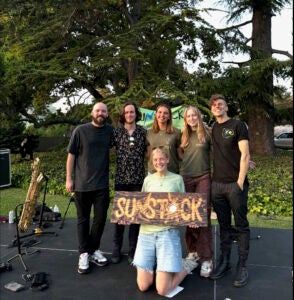
Funk brought more than a decade of experience in climate activism to his role on the SSC.
The singer/songwriter/multi-instrumentalist grew up in the Seattle area. As an undergraduate at Pomona College in Claremont, Calif., he met Graves in the environmental analysis program and got involved in the environmental movement in L.A.
“We felt urgently drawn to sustainability,” Funk says. “We wanted to save the world.”
The pair conceived Trapdoor Social in 2011 as an artistic project with environmental impact. Many of the band’s songs — such as “Winning As Truth” and “Never Stop Listening” — have climate-conscious themes. In 2013, they used the net proceeds from a crowdfunding campaign for their second EP to put solar panels on the roof of Homeboy Industries, an L.A. nonprofit that helps transform the lives of former gang members and incarcerated individuals.
By then, the band was touring nationally and looking for ways to reduce the carbon footprint of their road trips — their way of “fighting for the planet,” Skylar says. The solar trailer, purchased in 2015, became a way to use clean energy to amplify not only their own concerts but also events tied to the environmental movement, such as Youth Climate Strike Los Angeles rallies.
In June 2016, they founded and produced the first Sunstock Solar Festival — a nonprofit, indie-rock music and art festival powered by multiple solar generators — in L.A. They later took the festival around the country, starting in Berkeley, Calif.; UC Berkeley students put on the festival to this day.
Funk’s goal was to harness the power of music and community to kindle climate action. “It is an ongoing quest to figure out how to get people as excited about taking action for the environment as they are about going to concerts,” Funk says.
Greening USC
When Funk arrived at USC as a master’s student in fall 2023, he says he was impressed by USC President Carol Folt’s “meaningful leadership on sustainability.” The zero-waste program on the University Park Campus and at the Los Angeles Memorial Coliseum particularly excited him. The Sustainability Hub, a collaborative space that opened on the University Park Campus in September 2023, became his home base at USC.
He applied for and was selected to join the SSC that year. As graduate co-chair for the 2024-25 school year, Funk led key initiatives. He spearheaded a project observing how waste is sorted by users of the multistream waste diversion bins on the USC University Park Campus with slots for landfill, compost and recycling, and advocated for various initiatives to help USC achieve its goal of achieving Zero Waste.
In 2021, the Investment Committee of the USC Board of Trustees voted to freeze making new investments in fossil fuels and to liquidate current fossil fuel investments over the next several years. After Funk and others pushed for increased transparency in this process, the USC Investment Office agreed to produce biannual fact sheets to update the USC community.
Funk also pointed out that liquidation of USC’s fossil fuel investments wasn’t listed as one of the goals in the Assignment: Earth framework, and asked if it could be added. Both the PWG and the Investment Committee agreed it should be included. The updated framework will likely be published this month.
“Sky’s energy brings out people’s excitement and passion to be working on sustainability issues and to be doing so in community,” says Hannah Findling, sustainability program administrator in the USC Office of the President and USC Office of Sustainability, and a liaison to the SSC. “He’s a fantastic leader.”
Multihyphenate career
As Funk prepares to launch a music-teaching career, he plans to continue making music and touring with Trapdoor Social, among other gigs. Last year, the band signed their first record deal with Pasadena Records, building upon their success opening for the B-52s on their 2019 European tour. Fred Schneider, the B-52s’ frontman, contributed vocals to the song “Prophit” on Trapdoor Social’s latest album, Echobloom, which was released last year.
Funk — who speaks and writes lyrics in French, Spanish and Portuguese as well as English — is currently applying for a Fulbright Award to research music education in Brazil and looking for teaching opportunities in popular music in L.A. He hopes to integrate sustainability themes into his teaching and continue merging art with activism.
“I’m in search of kernels of wisdom and knowledge that we can use to find that magical recipe for [climate] action,” he says.

